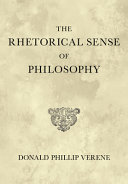

Most ebook files are in PDF format, so you can easily read them using various software such as Foxit Reader or directly on the Google Chrome browser.
Some ebook files are released by publishers in other formats such as .awz, .mobi, .epub, .fb2, etc. You may need to install specific software to read these formats on mobile/PC, such as Calibre.
Please read the tutorial at this link: https://ebookbell.com/faq
We offer FREE conversion to the popular formats you request; however, this may take some time. Therefore, right after payment, please email us, and we will try to provide the service as quickly as possible.
For some exceptional file formats or broken links (if any), please refrain from opening any disputes. Instead, email us first, and we will try to assist within a maximum of 6 hours.
EbookBell Team

4.4
12 reviewsRhetoric and philosophy are old enemies and old friends. The ancient rhetor (rhētōr) commanded an art of how to use words to affect an audience regardless of the truth of what was said. The philosopher sought only to apprehend the truth. To this end he used words dialectically, placing one idea against another in order to test their truth. The rhetorician and the philosopher shared the need to master words in order to practice their respective arts. Those in public positions relied on rhetoric as an art of persuasion in order to attain and hold power. Philosophers were seeking only to understand and express what was before them.
Then the sophists appeared, who, in contrast to the philosophers, teached subjectivistic, relativistic, and skeptical arguments. Against them stood Socrates, whose words were those employed by the many (hoi polloi). Through such speech Socrates sought the truth, wherever it might be found, by the question and answer of the elenchos. Thrasymachus, the sophist, says Socrates never answers any of his own questions but leaves it to others to answer them, while he, the master of elegant speech, can reply to any question on any subject. But to reply to Socratic speech is another matter. Socrates asks the question to which no answer is easily found.
To suggest the sense in which philosophy and rhetoric can be combined, I wish to consider how rhetorical speech both brings philosophical speech into existence and allows it to endure and be understood. This is what I mean by the rhetorical sense of philosophy. Rhetoric is the means by which philosophy can bring reason into words. Further, rhetoric is the means by which philosophy speaks to itself of its own nature and makes its ideas comprehensible.Above all, the rhetorical sense of philosophy is an attitude of mind, not to separate philosophy from its own use of language.